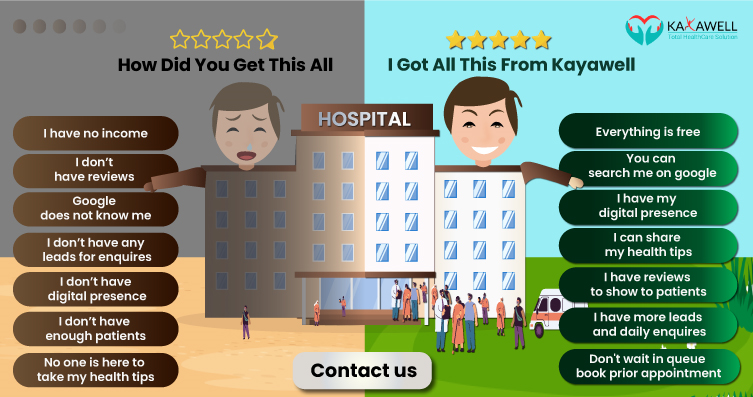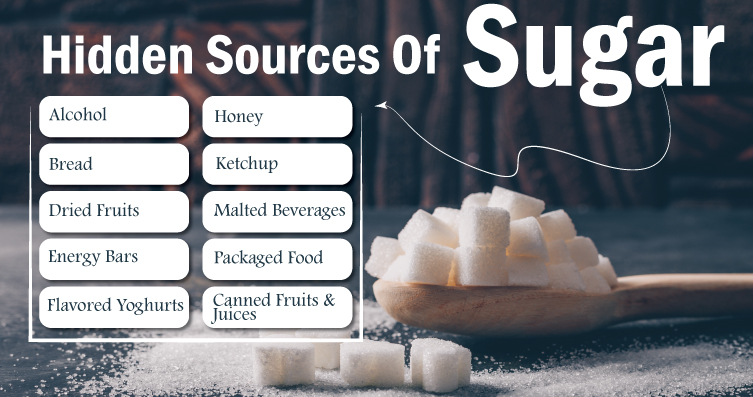Before heading ahead to know about hidden sources of sugar, let's first know,
How Much Sugar Should You Eat Daily?
On a daily basis, an average adult can eat a maximum of 24 grams (approximately six teaspoons) of added sugar as recommended by the World Health Organisation (WHO).
One should avoid high added sugar intake. They can do so by having a look at the nutritional labels on packaged foods before making a purchase. Try to follow the tips listed below to make a sound purchase decision.
Avoid foods containing over 15g of sugar per serve as they are considered high in sugar. Otherwise, you can go with foods with less than 5g of sugar per 100g.
Food packaging contains a list of ingredients in order of weight. The closer the ingredients will be from their beginning in the list, the more content they will have in the food.
If the ingredient list of food packaging contains different names of sugar with repetition several times, or their listing among one of the first four ingredients. In that case, food is highly likely to contain a high amount of added sugar.
- Why Excess Sugar Bad for You?
- There's an old proverb that states, "excess of everything is bad" then how can sugar consumption in excess be good for you? Therefore it is wise to eat sugar in moderation. Else you can face several health issues and diseases.
- Sugar is a carbohydrate, a nutrient that is essential for the body to create energy. Our body breaks down carbs into simple sugar such as glucose and uses it as fuel. When we eat so much sugar, our body has to store excess energy, which results in many diseases and health issues.
- Here are some of the diseases and health issues caused by sugar consumption in excess.
- Hypertension, insomnia, metabolic syndrome, etc.
- Tooth decay, cavities, tooth infection, or dental abscess.
- Other than this, consuming foods high in sugar is unhealthy because they do not contain other nutrients essential for the body other than carbohydrates. Likewise, protein, vitamins, and minerals.
- When we know the ideal amount of sugar consumption on a daily basis and the negative effects of having sugar in excess, it's time to know.

- Difference Between Natural and Added Sugar
- Natural Sugar:
- Sugar that originates naturally in food products is called natural sugar. Fruits and dairy products, originally unprocessed foods, are the best examples of natural sugar.
- Fructose is found in fruit, whereas lactose is the source of natural sugar in dairy products like milk and plain yogurt. However, besides sugar, these food products contain healthy nutrients as well. Likewise- fiber, vitamins, and minerals are considered a part of a healthy diet.
- Added Sugar:
- Sugar added to processed foods during cooking or before serving is added sugar. Added sugars basically do not provide any nutritional value for their consumers.
- Both natural sugar and added sugars can lead to health issues and diseases if consumed excessively. Still, foods containing natural sugar are generally healthier than processed sugar foods.
- Also, one thing that should always be in mind is that when a food label states 'no added sugar,' it may have a significant amount of natural sugar. Therefore, the food should be consumed in moderation, considering your daily sugar intake.
- Different Types of Sugar
- There are four different types of sugar which are as follows.
- 1. Glucose
2. Fructose (a.k.a. fruit sugar)
3. Sucrose (a.k.a. table sugar)
4. Lactose (a.k.a. dairy sugar)
- These four different types of sugar are further categorized into natural sources of sugar and added forms. As mentioned earlier, food products like fruits and dairy are natural sources of sugar (fructose and lactose). In contrast, processed foods contain added sugar that too under different names. Therefore, you should know most of the added sugars’ nicknames or hidden names of sugar that we have listed down. And check out for them on the package ingredients list.
-
- Evaporated Corn Sweetener
11 Hidden Sources of Sugar
- Here are some foods you need to be mindful of while consuming as they contain hidden sources of sugar.

- 1. Alcohol:
- Alcohol drinks such as wine, coffee liqueur, and mocktails contain high sugar. If you are on a mission to lose weight and strictly follow a healthy diet, you should keep an eye on your alcohol consumption or avoid alcohol intake completely, as it will only add up to your sugar intake. FYI, 150ml of wine contains around 1.2gms of sugar.
- 2. Bread:
- Bread is a rich source of carbohydrates and contains sugar as well. Because when the bread is baked, sugar is added in its fermentation process as starch that breaks down and is ingested by yeast to make it rise. Besides this, sugar additives are added to improve the taste and texture of the bread and give it a golden crust on the surface. So before buying it, you can check for the added sugars on its packaging.
- 3. Canned Fruits and Juices:
- Canned fruits and juices contain sugar as a preservative because it helps them prevent from getting spoiled and increasing their shelf life. Therefore, it is better to use fresh fruits and juices as they don't have added sugar and are full of nutrients than canned fruits and juices.
- 4. Dried Fruits
- Dried fruit like apricots, raisins, and dates have comparatively more sugar than fresh fruits. For a better understanding, a small box of raisins weighing 1.5 ounces has more than 25 grams of sugar. Instead, you can have a half cup of grapes for 12 grams sugar.
- 5. Energy Bars
- Energy bars, often considered a healthy option to eat, come loaded with sugar. Other than nuts and dry fruits, they have a yogurt or chocolate coating, chocolate chips, and sweeteners like corn syrup, brown sugar, honey, brown sugar syrup, dextrose, and fructose. That simply increases sugar levels and is unsuitable for health if eaten frequently.
- 6. Flavored Yoghurts:
- Plain yogurt is considered healthy as it contains beneficial bacteria which boost immunity and improves the digestion of an individual. On the other hand, flavored yogurt that contains sugar and its substitutes to enhance the flavor and taste of the yogurt is comparatively harmful to health. Because not only does it increases the caloric value of the food, but it also increases its sugar content in it.
- 7. Honey:
- Whenever you buy a bottle of honey from a store, don't forget to check the list of ingredients because packed honey may have added sugar. Even organic honey, which is widely believed not to have added sugar, contains enough natural sugar.
- 8. Ketchup:
- When you think of ketchup, you will only think of boiled ripe tomatoes, salt, and spices. However, there's more than this. If you ever check the label, you will find it also has sugar.
- 9. Malted Beverages:
- In most Indian households, you may find malted beverages that are mixed with milk and water. These beverages are considered healthy among them, but they don't know that these malted beverages contain sugar. And if we talk about flavored beverages, the amount of sugar in these drinks automatically increases. Even the habit of Indians adding more sugar to these drinks before serving made it worse for their health.
- 10. Packaged Food:
- Packaged food like biscuits, chips, breakfast cereals, and more, which we use in our day-to-day life, also comes packed with sugar. Therefore, it is wise to check for the label whenever and whatever packaged food we are going to purchase to eat.
- 11. Ready to Eat Foods:
- Similarly, we mostly prefer ready-to-eat foods for our breakfast that are not healthy due to the added sugar. It can be instant oatmeal, muesli, and other breakfast cereals. Therefore, it is best to go for a natural source of breakfast then the instant one and always check for the label on such ready-to-eat foods.
- Tips to Prevent Health Risk
- Earlier in this blog, we discussed the health risk of consuming sugar in excess. Now we will shed some light on the tips that can help you prevent health risks caused by sugar consumption.
- Eat whole food (whole fruits, legumes, whole grains, vegetables, and meat on the bone)
- Limit sugary breakfast foods (pancakes, waffles, muffins, and jams)
- Eat full-fat food (peanut butter, yogurt, and salad dressing)
- Prefer natural zero-calorie sweeteners
- Check for sugar in canned foods
- Avoid sauces with added sugar
- Following these tips, you can surely prevent health risks caused by sugar consumption in excess.
- Conclusion
- This blog discusses almost everything about sugar, its different types, hidden names of sugar, sugar consumption on a daily basis, health risks of consuming excess sugar, and tips to prevent them. Also, you get to know about the hidden sources of sugar that you consume on a daily basis without even knowing. Hope this blog will make you aware of the selection of food products and their consumption in the right amount to keep your sugar level in check.
-





Comments